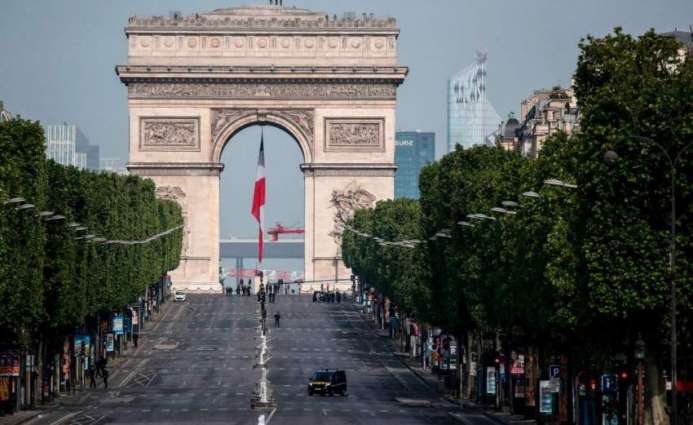Europe celebrates the 75th anniversary of the end of the Second World War on Friday, however, given that European countries are still in the midst of the COVID-19 pandemic, ceremonies will be limited to putting some flowers at the Unknown soldier monuments and perpetual flame in the countries concerned, as well as the appearance of a few articles, radio and TV programs about WWII, the darkest hours in European history
BRUSSELS (Pakistan Point News / Sputnik - 08th May, 2020) Europe celebrates the 75th anniversary of the end of the Second World War on Friday, however, given that European countries are still in the midst of the COVID-19 pandemic, ceremonies will be limited to putting some flowers at the Unknown soldier monuments and perpetual flame in the countries concerned, as well as the appearance of a few articles, radio and tv programs about WWII, the darkest hours in European history.
In 1945, Europe was in ruins, apart from a few neutral countries, from the Atlantic to Soviet Moscow and Stalingrad. The fascist regime of Adolf Hitler was destroyed but at a huge human cost. Nobody will ever know precisely how many civilians died, but the total toll reaches some 60 million deaths of both civilians and military, with 58 percent of the victims being civilians. This war is the most costly in human lives in history.
The Soviet Union's Red Army paid the highest tribute, with 53 percent of all military losses of all the armies involved, compared to 31 percent of the German army, 1.8 percent of the UK army and 1.3 percent of the US forces.
World War II officially ended in Europe on May 8, 1945, at 23:01 Central European Time (22:01 GMT). The unconditional surrender of Nazi Germany was signed on May 7 in the French northeastern city of Reims, and the capitulation was officially recorded in Berlin on May 8 at the heart of the Third Reich. German Field Marshal Wilhelm Keitel, the head of the High Command of the Wehrmacht, signed the capitulation treaty at the headquarters of the Soviet forces, led by Marshal Georgy Zhukov.
The turning point of the war occurred when the Germans were defeated in the Soviet city of Stalingrad on February 2, 1943. From that date on, the German armies suffered defeat after defeat and retreated on all fronts, from East to West.
In February 1945, the German city of Dresden was crushed by UK and US bombs. It was followed by the joining of Soviet and Anglo-American troops on April 25, 1945, in the middle of Germany, on the Elbe River.
On April 30, 1945, the suicide of Hitler in his bunker in Berlin sounded the death knell for German hopes. After that, it was up to his successor, Adm. Karl Donitz, to call for a halt to the war.
Allied heads of state and government, including Gen. Charles de Gaulle who led the French Resistance against Nazi Germany and chaired the Provisional Government of the French Republic, thus associated with the victors were able to simultaneously announce on radio stations the official cessation of hostilities in Europe.
Despite the capitulation of Nazi Germany, its ally, Japan, continued the war in the Pacific Ocean until two atomic explosions in Hiroshima and Nagasaki on August 6 and August 9, 1945, forced them to capitulate, nearly four months after Germany.
VERY FEW CELEBRATIONS IN EUROPE
The coronavirus pandemic did not allow European countries to properly celebrate the 75th anniversary of the end of the Second World War, but several symbolic commemorations were held in Germany, France, the United Kingdom and the other countries involved.
In London, Queen Elisabeth II will speak to the country's population on Friday evening in a message on BBC One at 20:00 GMT, which is the exact time that her father, King George VI, spoke on the radio in 1945, following a government statement.
In addition, restricted ceremonies were held in France, where President Emmanuel Macron, alone, laid a wreath in front of the statue of de Gaulle in Paris, and then at the Eternal Flame of the Unknown Soldier under the Arc of Triumph at the Champs Elysee.
The kings of Belgium and The Netherlands, Philippe and Willem-Alexander, as well as Denmark's Queen Margrethe II, laid flowers at the Tomb of the Unknown Solider, accompanied only by the representative of veterans.
In the Czech capital of Prague, politicians even went as far as going to the Tomb of the Unknown Soldier one by one, ten minutes apart.
Due to the pandemic, street rallies and other veterans' marches had to be canceled. Instead, governments encouraged people to celebrate at home by offering ideas for games or cooking recipes.
GERMAN AFD AMBIVALENT ABOUT CELEBRATIONS
Usually, Germany does not celebrate the anniversaries of the surrender of the Nazi regime to the Allies. However, this year, the city of Berlin decided to declare a holiday that is synonymous with defeat but also liberation from Nazism and of concentration camps a decision that has never been made before.
Initially, German President Frank-Walter Steinmeier had planned to hold a grand official ceremony with 1,600 guests but had to cancel it due to the pandemic. Such a celebration for May 8 has only taken place once in Germany in 1995. Instead, the president and Chancellor Angela Merkel laid a wreath in memory of the victims of the war and the Holocaust, which claimed the lives of 6 million Jews, and delivered a speech.
The leadership's decision to mark the anniversary of the war's end was criticized by the right-wing Alternative for Germany (AfD) party. The AfD has never been supportive of the Nazi regime but considers that many Germans were innocent victims in the war.
"Germans - and the world - were released from the criminal regime of the National-Socialists and from the 'total war' that they had unleashed; from 1945 to 1949 many Germans continued to be victims of internment and displacement, lynching, rape and forced deportation. Respect and piety towards them forbid to make May 8 a public holiday. The first Federal President, Theodor Heuss, interpreted May 8, 1945, as the most tragic and questionable paradox for each of us, because the Germans had been redeemed and annihilated. Heuss spoke of 'paradox,' but not of 'liberation,' and with good reason," Marc Jongen, the AfD's cultural policy spokesman in the Bundestag, said in a press release on Friday.
The AfD said that Germans were not only the perpetrators of the war but also victims. They have repeatedly given the example of the bombing of Dresden by the UK and US air forces with phosphorous bombs, which killed tens of thousands of civilian refugees as the war was coming to an end, despite Dresden not being a military objective. Even in the United Kingdom, after the war, then-Prime Minister Winston Churchill was and is still considered tarnished in his reputation by the decision to deliberately kill civilians.
"Anyone who uses the rhetoric of liberation in a generalized way today must know the dubious tradition, in which it is based. 75 years after the end of the war, it is important to endure the ambivalence of history and to avert the impending orientation of our memory culture towards false and dangerous simplifications. Because, according to then Federal President Roman Herzog in his speech in Dresden in 1995, you cannot find peace or reconciliation if you do not face the whole story," Jongen added.
In response, the president of the Jewish Council in Germany, Josef Schuster, slammed the AfD's position, saying that Germans' presentation mainly as victims is "an irresponsible historical relativization of Nazi crimes."
The AfD's position has also been strongly condemned by all of Germany's other political parties.
"We know the lessons of our long history. From hatred was born the dictatorship, and the dictatorship led to war," Secretary of State for Culture Monika Grutters said.
Most European countries do not give a day off for this important date, which, above all, marks a military victory.
In France, in 1975, then-President Valery Giscard d'Estaing wished to put an end to this commemoration in the desire to reconcile with Germany, but the reaction of veterans' associations was very strong. Later, in 1981, then-President Francois Mitterrand made May 8 a day off without any objections from citizens.
Meanwhile, neither the United Kingdom nor the United States is on holiday on May 8, although they have reasons to commemorate this anniversary.
For most families in Western Europe, the anniversary means the end of sufferings, victory and deliverance, which made it possible for the next 30 years to be the years of great economic development, the "30 glorious years," as French economist Jean Fourastie has said.




